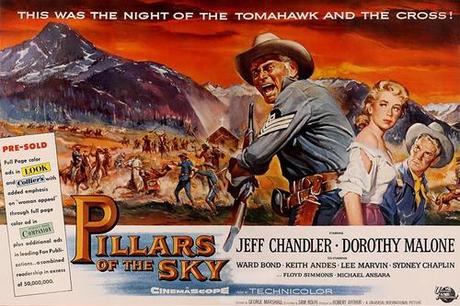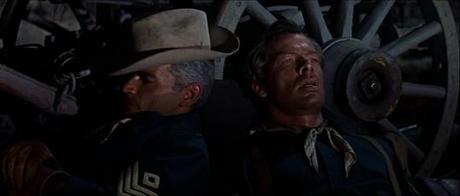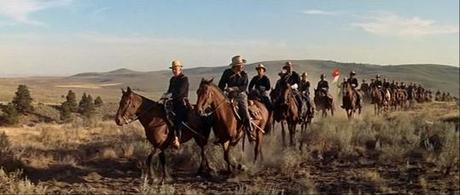
Over the years there has been a good deal of ill-informed, and one might even say uninformed, material written and spoken about the classic western, and the depiction and treatment of the Native American Indian has arguably attracted the lion's share of this negative commentary. That's perhaps a slightly blunt way to open a post but it does rankle some to see unjustified assessments go unchallenged, not least because it contributes to critical neglect of the genre and a subsequent lack of appreciation and/or interest among potential viewers. Today, it feels as though we are increasingly living in a world of absolutes, one of stark blacks and whites where the very idea of nuance or shading is either dismissed outright or mercilessly lampooned. I suppose that one of the aspects that regularly draws me back to the classic 1950s version of the western is both the ease and the courage with which so many productions navigated moral, and historical complexities. Pillars of the Sky (1956) is an interesting entry in the decade's Indian cycle, one which adds religion and its influence on the conflict on the frontier into the blend.
It's Oregon a few years after the end of the Civil War, and First Sergeant Emmett Bell (Jeff Chandler) is responsible for patrolling the reservation in tandem with his Nez Perce scouts. The general direction of the tale is a familiar one for anyone who has seen more than a few westerns from this era. Treaties will be compromised in the name of progress, trust betrayed in the name of expediency, and conflict stoked up off the back of misunderstandings. Still, before the storm comes the calm, represented by the peace efforts of missionary Dr Joseph Holden (Ward Bond). Holden is one of life's true believers, a man who seeks to bring civilization and all the benefits he associates with his religion to the varied tribes sharing the reservation. Bell presents a more pragmatic face but one which is no less sincere or well-meaning for that. The arrival of the new commanding officer with with orders to supervise the construction and policing of a road through the territory spells trouble. For the army these are orders that have to be executed, for the Indian they are evidence of further hollow promises - whatever the perspective, the end result will be a fight nobody really wants yet one nobody really knows how to avoid either.

Adapted from a Will Henry story, Pillars of the Sky is a typically mature piece of work, eschewing any temptation to paint in broad brush strokes and present the viewer with a simplistic heroes and villains stand-off. As is the case in so many conflicts, there are no clearly delineated good or bad guys, just people manipulated by circumstances and personal loyalties into a situation that can all too easily slide out of control. What sets this production apart from other thoughtful appraisals of the frontier wars is the prominence afforded to the religious aspect. Now some may find this overdone, and I can imagine that accusations of excessive piety might be leveled. Personally, I'm not sure that it has to be approached in that way - the theme here relates to co-existence as far as I can see. Digging a little deeper, it deals with the idea of reaching an accommodation, and on a number of levels. There is of course the wider accommodation being sought between two competing civilizations and cultures, while a range of smaller and more personal examples are to be determined among the characters.
Let's look at some of those characters then. Firstly, Jeff Chandler's hard-bitten Sergeant Bell is man having to come to terms with a number of changes and challenges in his life. He has gone from being a Civil War officer to a peacetime non-commissioned man, leading to some amusing confusion for a young lieutenant who served under him in the past and still finds himself saying "Sir" to the man he's now giving orders to. Bell's struggle is dual one: he must reconcile his humanitarian instincts with the prickly toughness his years of hard experience have brought about while at the same time assessing his feelings towards a woman he loved and then apparently lost. That woman is Calla Gaxton (Dorothy Malone) and her own path is far from certain, having come west to make a final choice between her old flame Bell and her husband Captain Gaxton (Keith Andes). While this triangle is supposed to add another layer of drama to the story, it ends up as one of the weaknesses for me, with Malone underused and the competition between Chandler and Andes proving something of a damp squib alongside the genuine explosiveness of the main plot strand.
Ward Bond's missionary offers him a good role, allowing him to indulge in some larger than life bluster while displaying an equal measure of compassion. And there you have the conflict faced by his character - how best to apply his Christian principles to circumstances and an environment inherently hostile to such ideals. When it comes to portrayals of army brass, it's common to see inflexible martinets blindly provoking violence yet Pillars of the Sky offers a welcome way around that tired cliché by having Willis Bouchey play an officer who is aware of his own fallibility. Lee Marvin adds another colorful supporting role to his CV as a characteristically hard drinking Irish sergeant. There's a good deal of broad comedy in his part but plenty of pathos too in his later scenes in the aftermath of the big Indian attack. On the other side of the battle lines, Michael Ansara gives good value as the warrior Kamiakin who has firmly rejected the missionary teachings and contrasts nicely with Sydney Chaplin's devout and devoted scout.

George Marshall might be best known for making the classic Destry Rides Again - mind you, I'd argue that his own remake of that film Destry in 1954 runs it very close. His long career covered most genres and he made a handful of other notable westerns in the 1950s in The Sheepman and The Guns of Fort Petticoat. I'd rate this among his better movies, for the rich and less common theme and the superb visuals too. CinemaScope westerns are attractive as a rule and the the shooting of the Oregon locations, with the help of cinematographer Harold Lipstein, is quite breathtaking at times, managing to recall Frederic Remington paintings in some shots.
Pillars of the Sky has been released on DVD in a variety of territories over the years and I suspect the same master will have been used for all of those. Universal International productions have a distinctive look and as viewers we're fortunate to be able to enjoy so many of these via excellent prints and transfers. I have the German release of this movie from Koch and it looks very fine with a sharp, detailed and colorful image. In brief, this is a strong western, and another that has not received its full due, perhaps in part because of the reasons I alluded to in the introduction above. So, if anyone who is keen on westerns has yet to see this one, I recommend they look into it - it has action, drama, visual splendor and intelligence. Check it out.
